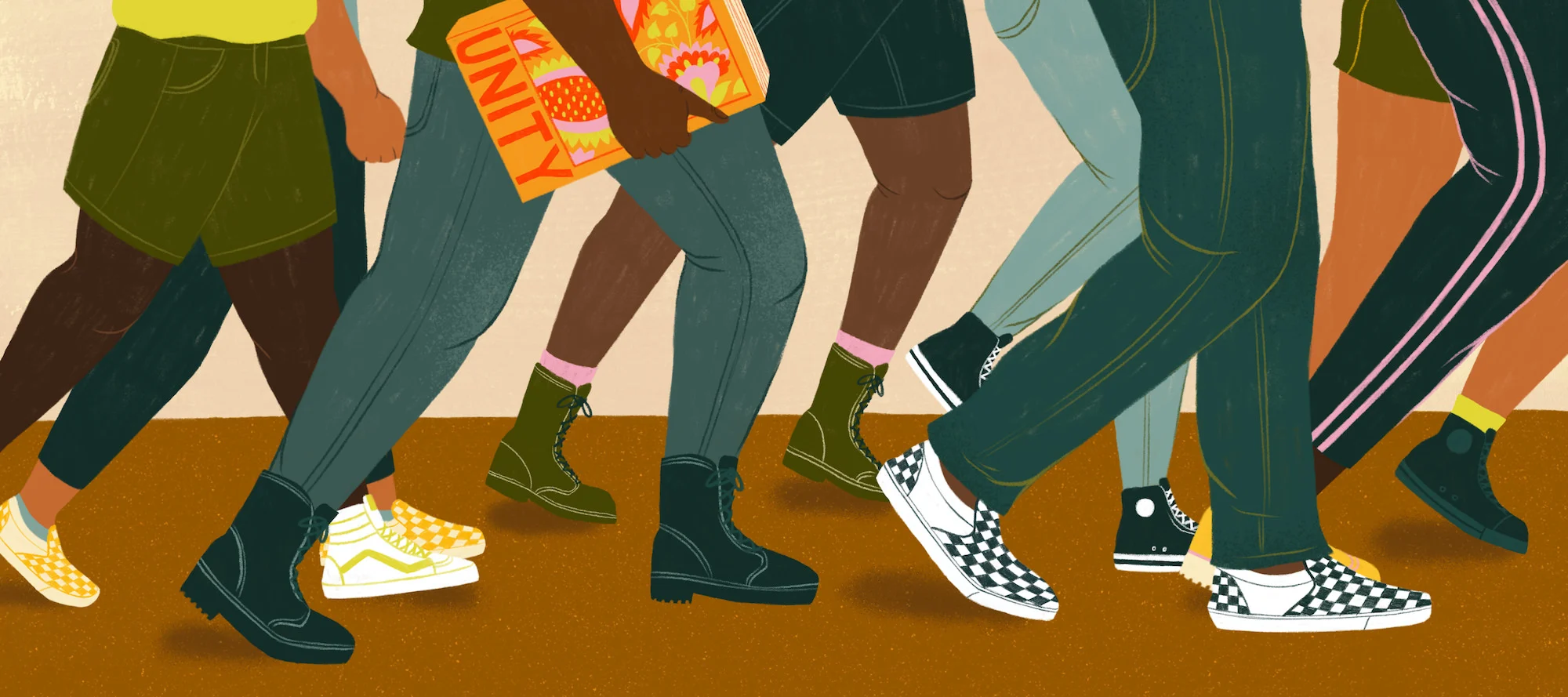The Ceiling Is Not Enough
- 22 March 2021
- ByChelsea Castle

How we must bust through all barriers to achieve true equity for women in work
When I was first asked to write about women’s equity, I instantly hesitated.
How ever could little old me do justice to such a momentous topic? What could I possibly have to say that would add value to the conversation? Surely, even the best research in the world would not help me produce a fresh take on the many barriers to equity that women face.
With a shallow pause and deep breath, I realized that this very type of thinking is part of the problem.
The self-doubt. The intimidation. The belief that my own experience or voice is not valid or worth sharing.
Women cluster in communities and Clubhouse rooms to commiserate over their imposter syndrome. Meanwhile, men proudly display their expert syndrome in work meetings and on Clubhouse stages.
For every one man advocating for a woman, you have at least three more men talking over her.
And for every woman advocating for herself, you have at least three more women talking behind her back.
These are generalizations, but they’re rooted in truth. I’m thankful for the women and men who don’t exhibit these behaviors, and the truth is that we need more of them.
Advocacy
In preparation for this article, I asked a handful of women - friends, former colleagues, family, and even Twitter friends - about our greatest barriers to equity. Many answered: Ourselves. One response mentioned that she feels some settle for less because fighting for more can be so downright exhausting.
But now is the time to find inspiration and hope in the fact that pushing through and speaking up has always been part of the solution. When it can sometimes feel impulsive to needlessly self-censor as women, whether to preserve the status quo or our energy, we should remember others who do the work.
From Susan B. Anthony and Elizabeth Cady Stanton to Tarana Burke and Malala Yousafzai, and every female activist in between. It brings tears to my eyes thinking about the countless women who’ve unleashed their voices and fought tooth-and-nail for the many rights women now possess. But in that same breath of gratitude, we must also recognize that we still have a long way to go.
It was only 40-some years ago that women earned the right to control their own money. My father was old enough to drink alcohol when women were first allowed to possess their own bank account.
My first call-to-action to continue working toward change is advocacy. As women, it’s paramount that we continuously learn and practice advocating for ourselves. Let us proudly stand on the shoulders of the women who are responsible for the broken ceiling glass beneath our feet. Feel the weight of the barriers broken by Kamala Harris, Kim Ng, Madam C.J. Walker, Kathryn Bigelow, and countless others.
As women, we are already doing so much. We work hard to be everything to everyone, whilst barely finding the time to take care of ourselves, too, let alone fight for change in a world where the odds are stacked against us.
But let us find inspiration and strength in what so many women before us have overcome. There are many ways we can live into this practice:
Challenge your thoughts of self-doubt
Practice being aware of when you may be experiencing “stereotype threat,” which are situational moments where one may feel themselves at risk of conforming to stereotypes about their identity or social group
Assume everything is negotiable - the worst they can do is say no
Embrace failure as a good thing that's necessary for success
Advocating for other women
We must also advocate for other women. Gender roles have been imposed upon us for so long and are so ingrained in society that we can fall victim to perpetuating patriarchal behavior.
We are all products of a male-dominated society, whether we like it or not. As Brené Brown once said, “The patriarchy is not the shark. It is the water we swim in.” We're all swimming in it, but we can try to get out of the damn water, can’t we?
There is immense power in lifting fellow women - by being advocates for each other in the workplace, and sharing our experiences and ways of overcoming the pressures that weigh us down. Just as a rising tide lifts all boats, one woman’s success can only benefit the greater whole.
We also need more male allies in the workplace. Men, talk to your mothers, sisters, wives, and daughters. Ask about their experiences and listen - truly listen and empathize - to their stories. Read books by Claudia Chan and Caroline Criado Perez. Watch films like Hidden Figures, Selma, and On the Basis of Sex. If podcasts are more your style, this is a killer list of ones to check out.
Continually educate yourself and learn how your behavior impacts women around you in the workplace - and how you can choose empathy over learned behavior. What may seem like the smallest of actions can truly help make a difference.
Advocating for women of color
Most importantly, we all need to be better advocates for women of color. Every barrier to equity you can think of is bigger, taller, and more impossible to climb for Black women, Latinx women, and Asian women.
Black women earn 63 cents for every $1 that male counterparts earn, they make up .03% of executive and senior-level positions, and there are three female Fortune 500 CEOs.
Asian women make up 27% of the corporate workforce and only 2.6% of Fortune 500 board seats while making up almost 6% of the U.S. population.
Compared to men, Latinas are paid 46% less. And compared to white women, they're paid 13% less. All of this without a difference in skills or professionalism and the pay gap worsens at higher levels of education.
All of which barely scratches the surface of the inequity and discrimination that Black, Indigenous, and other people of color face every day.
Being advocates for women of color is bigger than me, this article, and Women’s History Month. It is a significant and ongoing practice. For white women, here are some places to start:
Help amplify the voices of women of color in your workplace.
Be attentive to when a woman of color is speaking, interrupted, included, or not included. And find opportunities to support them and elevate their voices in those moments.
Perhaps the most important thing you can do is talk less, and listen more.
The work is truly about continuously educating yourself and using your voice when and where appropriate. (And knowing when not to use it.) I suggest beginning with How to Be An Antiracist by Ibram X. Kendi, this article, and the brilliant work of Rachel E. Cargle.
Regulation
The issue of women’s equity is vast and multifarious, with many socioeconomic principles at play. We’d be remiss to not address the critical legalities and regulations also needed to further break down equity barriers in the workplace.
We’ve made great gains in the last century, but outdated laws and persistent inequalities still mar us.
The largest barriers before us are the gender pay gap, undervaluing of “pink jobs” (nurse, teacher, secretary, waitress, etc.), lack of limited maternity leave, or the lack of equally affordable healthcare.
Through continued advocacy, education, and conversations, we’re further enabled to have an impact on legal change as citizens. We’ll share some resources below on how you can get involved on local, statewide, and national levels. It may seem intimidating, but if history has taught us anything, it’s that our voices as citizens can and do impact change.
Conversation beyond education
The act of advocacy and education is most effective when shared and discussed. As humans, we are hard-wired for connection. When we engage in conversations with others about these important topics, we can continue to break down all of the metaphorical barriers between and around us.
Through these conversations, we can open the doors to vulnerability. And when we’re vulnerable, we’re our most courageous selves.
“The irony is that we attempt to disown our difficult stories to appear more whole or more acceptable, but our wholeness—even our wholeheartedness—actually depends on the integration of all of our experiences, including the falls.” – Brené Brown
May we find and create opportunities to share more of our stories with one another, to inspire more courageous action and integration of our experiences. I believe it is through these wholehearted practices that we can continue achieving progress.
Having the hard conversations not only inspire and promote change, but they provide accountability and a support system for the really hard work. Engaging in dialogue on these topics enables us to challenge the very structures that hold us back.
May this article be a reminder of how far we’ve come, and how far we can go.
May this serve as a thank you and tribute for all women whose power, strength, and work we are indebted to.
And may this be a declaration that breaking the glass ceiling is not enough. The ceilings are shattering all around us. We are ready to break more.
If you’re inspired to continue taking action through the use of your time, energy, voice, or money, here are some helpful resources to get you going:
Article header image created by illustrator Nicole Medina.
22 March 2021
Words by:Chelsea Castle
Tags
- Share

